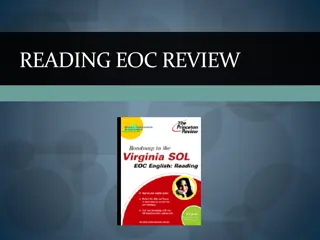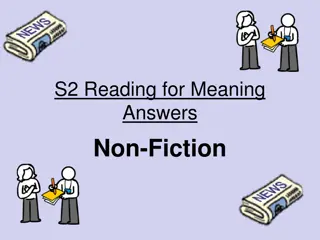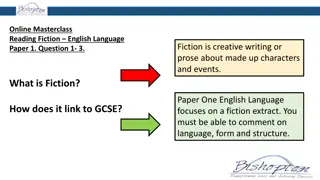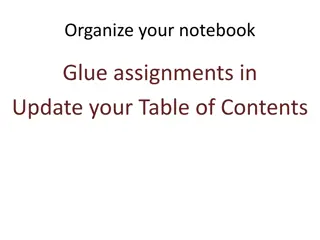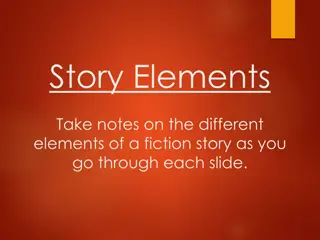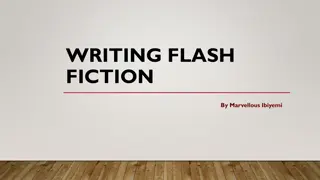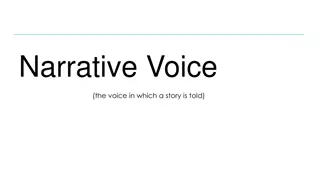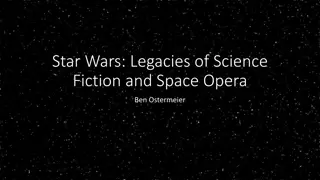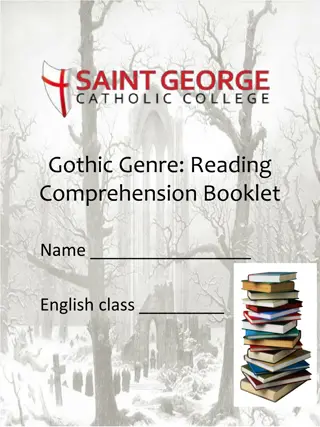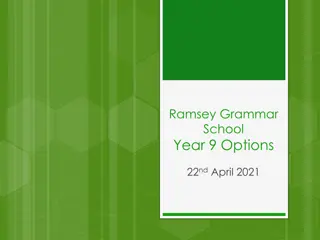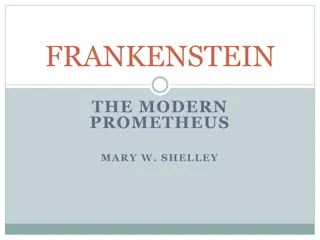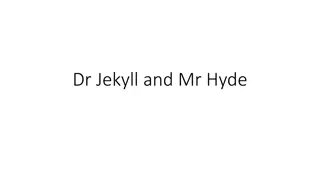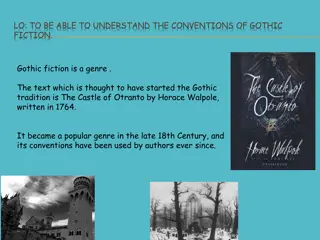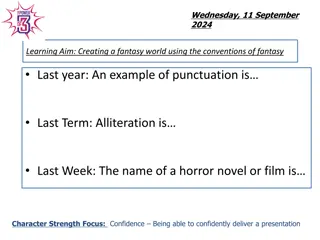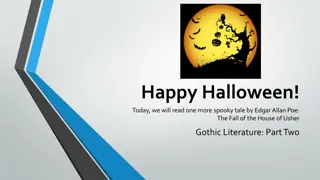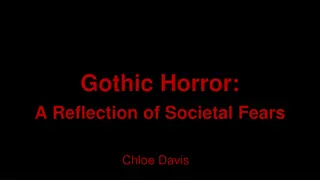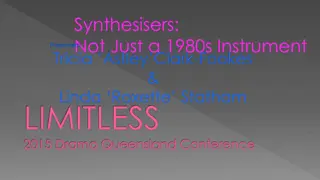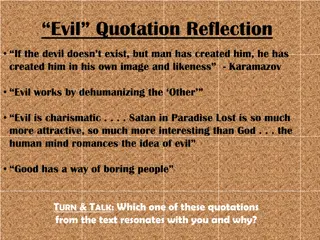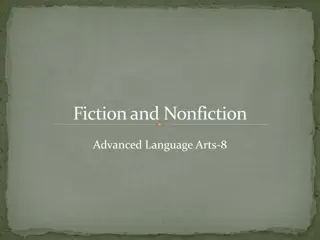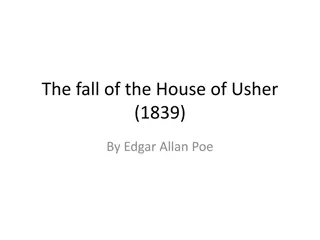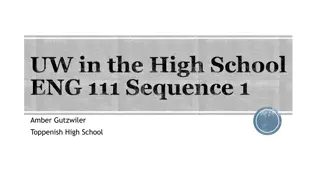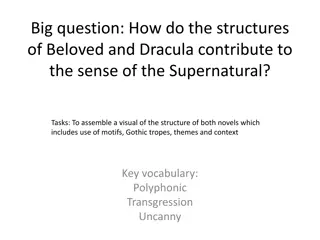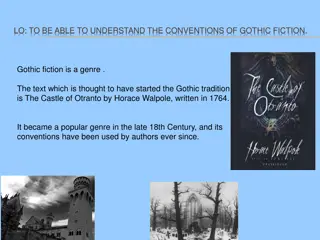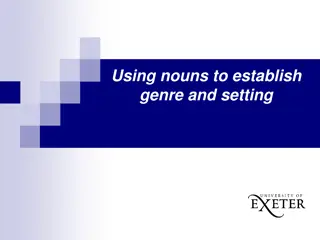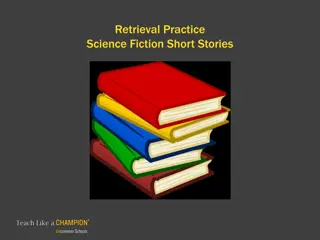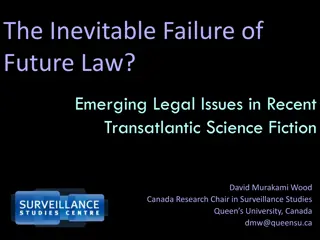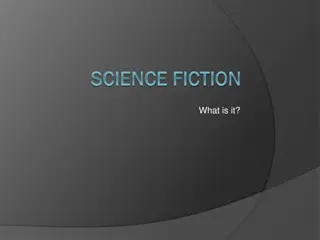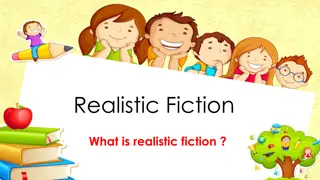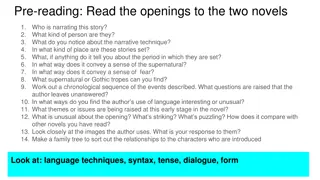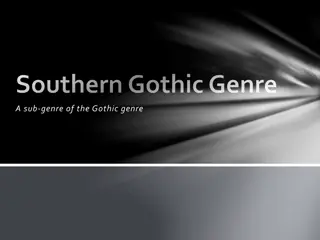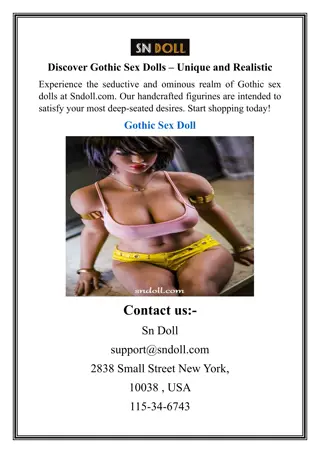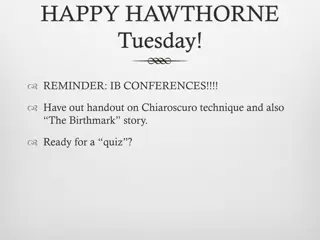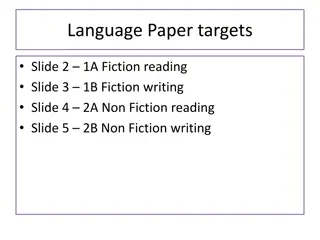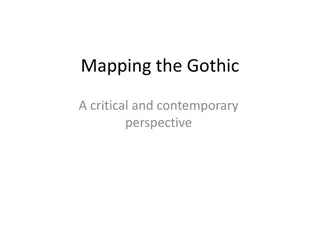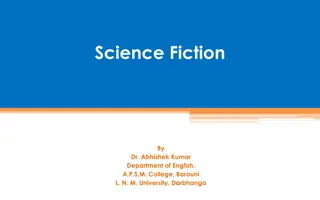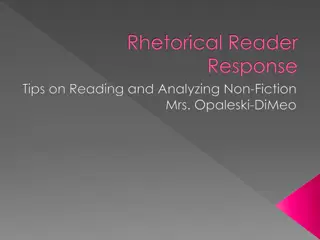Exploring Citizen Journalism and Non-Fiction Writing
Explore the world of citizen journalism and non-fiction writing, learning about text types, adapting writing to conventions, considering audience, purpose, and tone. Discover the significance and usefulness of non-fiction writing, and delve into creating various text types. Uncover the role of citiz
1 views • 11 slides
Reading EOC Review: Test Structure, Types of Selections, and Breakdown
The Reading EOC Review covers the test makeup, types of reading selections, and breakdown of questions and content to help you prepare effectively. The test comprises sections with 55 scored questions to be answered, focusing on functional literacy and narrative/fiction elements, including poetry, p
8 views • 26 slides
Exploring Contemporary Non-Fiction Themes
Delve into diverse non-fiction topics such as pet pampering, societal contradictions in teen reading habits, environmental concerns like plastic pollution, and societal opinions on education and lifestyle choices. Discover intriguing discussions and thought-provoking insights in this engaging collec
0 views • 55 slides
Understanding Fiction Through Text Analysis: Paper 1 English Language Masterclass
Delve into the world of fiction through an analysis of the novel "Girl With a Pearl Earring". Explore how language, form, and structure are used in the extract to captivate readers. Discover the characters, setting, and narrative techniques employed by the writer to engage and intrigue readers. Unco
2 views • 7 slides
Exploring Historical Fiction: Elements and Examples
Discover the essence of historical fiction, its key elements, and examples like "Forrest Gump." Learn how plausibility and interpretation play pivotal roles in creating captivating narratives that blend fiction with historical events.
0 views • 11 slides
Spring 2015 English 110 Final Exam Information
Spring 2015 English 110 Final Exam includes an Essay Final Exam to be completed by May 21st and an Objective Final Exam on May 27th or May 28th. The Essay Final consists of flash fiction tasks, literary criticisms, and analysis, while the Objective Final covers fiction elements identification and an
0 views • 7 slides
Essential Elements of Fiction Storytelling
Dive into the key components that make up a compelling fiction story, including plot development, setting, mood creation, character conflicts, and the use of imagery and dialogue to enhance the reader's experience. Explore these foundational elements to enhance your storytelling skills.
1 views • 36 slides
Crafting Compelling Flash Fiction: Techniques and Examples
Dive into the world of flash fiction with this informative piece detailing the essence, types, and techniques of writing succinct yet gripping stories. Learn how to hook readers from the start, use impactful scenes over summaries, and create lasting impressions with minimal words.
0 views • 18 slides
Understanding Narrative Voice in Fiction Writing
Explore the elements of narrative voice in fiction writing, including tense, perspective, and language choices. Learn how authors decide on the tense and perspective for their stories, and consider different language styles that suit various characters and perspectives. Discover the nuances of first
1 views • 7 slides
Influential Works in Science Fiction and Space Opera Literature
Explore the significant influence of classic science fiction novels like "War of the Worlds," "A Fighting Man of Mars," "Second Foundation," "2001: A Space Odyssey," and "Children of Dune" on the creation of iconic space opera narratives such as Star Wars. Delve into the themes, settings, and charac
0 views • 16 slides
Understanding the Gothic Genre Through Reading Comprehension Booklet
Dive into the mysterious world of the Gothic genre with a reading comprehension booklet featuring texts that will challenge your comprehension skills. Explore the eerie atmospheres, detailed descriptions, and captivating narratives that define this intriguing literary genre. Enhance your reading str
0 views • 15 slides
English Language Cambridge IGCSE Course Overview
Students of the Ramsey Grammar School Year 9 English Language Cambridge IGCSE course will engage in reading and analyzing various fiction and non-fiction texts, honing comprehension skills, crafting written pieces with clarity and purpose, and enhancing their ability to summarize and re-imagine cont
1 views • 7 slides
Analysis of Romantic and Gothic Elements in Frankenstein by Mary Shelley
This analysis explores the parallels between Mary Shelley's Frankenstein and Romantic and Gothic literary elements, delving into themes of creation, hubris, nature, and the supernatural. The narrative revolves around Victor Frankenstein's pursuit of creating life, intertwined with Romantic ideals an
1 views • 11 slides
Understanding Gothic Literature Features and Analysis for Exam Preparation
Explore the key features of Gothic literature, including elements like supernatural imagery, isolation, and extreme emotions. Dive into quick questions and extended response tasks to deepen understanding. Get insights on relevant vocabulary and how to analyze extracts effectively for exams.
1 views • 58 slides
Understanding Gothic Fiction Conventions
Explore the origins and key features of Gothic fiction, including dark settings, supernatural elements, and eerie atmospheres. Analyze gothic story openings and extract examples from works like Frankenstein to understand gothic features and emotional impact.
0 views • 25 slides
Exploring the Origins and Evolution of Gothic Literature
Gothic literature traces its roots back to Horace Walpole's novel "The Castle of Otranto," characterized by medieval settings, supernatural elements, and themes of terror and fear. Writers like Mary Shelley, Bram Stoker, and Edgar Allan Poe further popularized the genre with works such as "Frankenst
0 views • 6 slides
Exploring Fantasy Worlds: Conventions, Types, and Challenges
Dive into the realm of fantasy literature and learn about the conventions, types, and differences between fantasy and sci-fi. Uncover the definition of fantasy, explore popular genres, and discover sub-genres like fiction, science fiction, and historical fiction. Engage in thought-provoking challeng
0 views • 17 slides
Gothic Literature: The Fall of the House of Usher Analysis
Explore Edgar Allan Poe's The Fall of the House of Usher, identifying elements of gothic literature, parallel structures, and the author's purpose. Analyze characters, settings, and themes while drawing conclusions about the story's eerie atmosphere.
0 views • 28 slides
Washington Irving: Father of American Fiction and Pioneer of American Romanticism
Washington Irving, an influential American author of the early 19th century, is revered as the Father of American fiction. Known for iconic works like "The Legend of Sleepy Hollow" and "Rip Van Winkle," Irving played a crucial role in establishing American literature as an independent art form. His
1 views • 14 slides
Gothic Horror: A Reflection of Societal Fears and Its Influence in Young Adult Literature
Gothic horror, as reflected in media creations like Dracula and Twilight, serves as a mirror to societal fears. Through themes of darkness, supernatural elements, and exploring anxieties, the genre provides a safe space for societal introspection. This content delves into how Gothic horror motifs in
0 views • 10 slides
Exploring Physical Theatre and Gothic Themes in Teaching Synthesis
Workshop on teaching synthesis through physical theatre and Gothic themes. Learn about synthesising concepts, managing assessments independently, and incorporating subject content in learning. Discover methods for teaching synthesis and enhancing student learning experiences through drama activities
0 views • 26 slides
Exploring Dark Themes in Gothic Literature
Delve into the depths of Gothic literature with reflections on evil, doppelgängers, and the allure of darkness. Discover how this genre weaves tales of the grotesque, mysterious, and fearful, captivating readers with eerie settings and emotionally complex characters. Unearth the essence of the Goth
0 views • 6 slides
Understanding Fiction and Nonfiction in Language Arts
Fiction and nonfiction are two key genres in literature. Fiction involves imaginative storytelling with elements like plot, characters, setting, point of view, and theme. Nonfiction, on the other hand, deals with real people, events, and ideas, aiming to inform, persuade, or entertain readers. Explo
0 views • 14 slides
Gothic Literature and Edgar Allan Poe: A Deep Dive into the Dark and Mysterious
Delve into the world of Gothic literature through the works of Edgar Allan Poe, a master of the genre. Explore the eerie settings, melodramatic narratives, and sense of fear and dread that define Gothic literature. Discover Poe's life story, his struggles, and his enigmatic persona that still intrig
0 views • 31 slides
Gothic Literature Analysis and Exploration in ENG 111 Sequence
Dive into a captivating journey through Gothic Literature with in-depth analyses on works by H.P. Lovecraft, exploration of Vampire Literature, and literary examinations of classics like Dracula and Frankenstein. Uncover rhetorical strategies, thematic elements, and enduring impacts in this ENG 111
0 views • 5 slides
Analyzing Supernatural Elements in the Structures of Beloved and Dracula
Explore the influence of structure on the supernatural in Beloved and Dracula through motifs, Gothic tropes, themes, and context. Understand the concepts of polyphonic, transgression, and the uncanny in relation to the novels, while considering elements like multiple voices, shifting identities, and
0 views • 12 slides
Understanding Gothic Fiction Conventions in Literature
Gothic fiction is a captivating genre rooted in dark, mysterious settings, supernatural elements, and eerie atmospheres. Originating with "The Castle of Otranto" by Horace Walpole, this genre has evolved to encompass elements like family curses, isolated castles, and sinister creatures. Dive into th
0 views • 25 slides
Creative Noun Usage in Science Fiction Writing
Explore the art of using nouns to establish genre, setting, and character names in science fiction writing. Learn how authors like Philip Reeve utilize proper nouns to create immersive worlds and unique characters. Delve into the significance of authentic text, discussion, and purposeful learning pr
0 views • 10 slides
Science Fiction Retrieval Practice: Short Stories Insights
Explore futuristic technologies, incongruity, and speculative fiction elements in science fiction short stories like "Robbie" and "There Will Come Soft Rains." Uncover the connections to historical events, like the Cold War, through literary analysis of these captivating narratives.
0 views • 16 slides
Exploring Legal Themes in Science Fiction: The Inevitable Failure of Future Law
This study delves into emerging legal issues in recent transatlantic science fiction works by authors like Charles Stross, Ken McLeod, and Paolo Bacigalupi. It examines the portrayal of law in SF and what insights it offers about our legal systems. Through a systematic survey of over 300 novels and
0 views • 12 slides
Exploring the World of Science Fiction
Science fiction is a genre that delves into imagined future scientific and technological advances, exploring major societal and environmental changes, space travel, time travel, and life on other planets. It combines elements of science and fiction to create believable yet captivating narratives tha
0 views • 14 slides
Understanding Realistic Fiction: Features and Examples
Realistic fiction is a genre of writing that portrays characters, settings, and events that could exist in real life, even though the story itself may be fictional. The key features include believable characters, realistic settings, everyday problems, and plausible solutions. By sorting book covers
0 views • 9 slides
Comparative Analysis of Gothic Novels: Dracula and Unnamed Story
The provided texts delve into the openings of two different Gothic novels, exploring narrators, settings, supernatural elements, and narrative techniques. Readers are encouraged to analyze the themes, characters, and use of language by the authors in the early stages of the stories. Epigraphs from t
0 views • 13 slides
Southern Gothic Genre, Magical Realism, and Their Characteristics
Southern Gothic Genre is a sub-genre of the Gothic genre characterized by settings in the South, eccentric flawed characters, grotesque activities, irony, and social commentary. Magic Realism combines realistic events with surreal elements, portraying world views through others' eyes and experiences
0 views • 4 slides
Discover Gothic Sex Dolls Unique and Realistic
Experience the seductive and ominous realm of Gothic sex dolls at Sndoll.com. Our handcrafted figurines are intended to satisfy your most deep-seated desires. Start shopping today!\n\n\/\/sndoll.com\/shop\/thick-white-gothic-hot-sex-doll\/
3 views • 1 slides
Introduction to Romantic, Gothic, and Chiaroscuro in Literature and Art
Explore the fascinating worlds of Romanticism, Gothic literature, and Chiaroscuro technique through images and informative content. Learn about the themes, styles, and key elements of these artistic movements that have influenced literature and art. Engage with the duality of light and darkness, the
0 views • 17 slides
Language Paper Targets for Fiction and Non-Fiction Reading and Writing
This content provides detailed targets for Language Papers, focusing on Fiction and Non-Fiction reading and writing skills. It covers strategies such as being specific in analysis, using evidence from texts, improving sentence structures, enhancing vocabulary usage, and applying language techniques
0 views • 14 slides
Mapping the Gothic: A Critical and Contemporary Perspective
The content delves into the critical analysis of the Gothic genre from both historical and modern viewpoints. It explores themes such as terror, repression, border-crossing, and the powers of imagination. Further sections discuss contemporary Gothic literature, character creation, and recommended re
0 views • 7 slides
Evolution of Science Fiction Literature
Science fiction genre, blending imaginative fantasy with scientific principles, has evolved significantly over time. Initially emerging in the late 1800s, it gained popularity alongside technological advancements. Theodore Sturgeon highlighted the essence of human stories within the genre. Iconic wo
0 views • 8 slides
Effective College Reading and Analysis Strategies for Non-Fiction Texts
Enhance your non-fiction reading and analysis skills with these practical tips: prepare yourself mentally before reading, preview the article, highlight key points while reading, monitor comprehension, and summarize the article afterward. Additionally, learn how to create a rhetorical précis to eff
0 views • 19 slides

